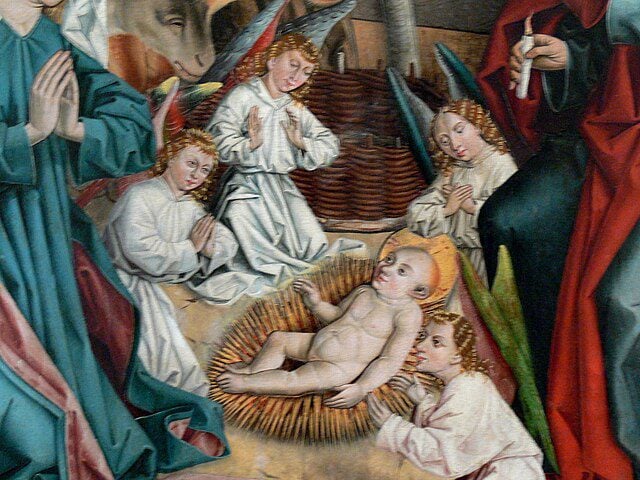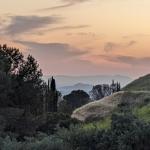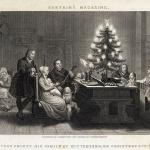(A Dharma talk first delivered by Edward Sanshin Oberholtzer, Roshi a couple of days ago and now reprinted here with a tiny bit of editing making it for today rather than those few days ago. Edward is the guiding teacher for Empty Moon Zen. Shared with permission.)
***
Within nothingness the road is free of dust
If you can simply avoid mentioning the emperor’s name,
you will surpass the eloquence of the Sui dynasty poet.
Third of the Three Ranks, translated by Robert Aitken
It’s Christmas
And what can an old heathen do but turn to Charles Dicken’s Christmas Carol for a bit of inspiration. My mind this morning is still a little foggy, so…..Once upon a time—of all the good days in the year, on Christmas Eve—old Scrooge sat busy in his counting-house. It was cold, bleak, biting weather; foggy withal; …..”ah, foggy,…yes, now there’s a theme”….The fog came pouring in at every chink and keyhole, and was so dense without, that, although the court was of the narrowest, the houses opposite were mere phantoms. To see the dingy cloud come drooping down, obscuring everything, one might have thought that nature lived hard by, and was brewing on a large scale.
And if you had looked out of my windows this past week, you might have wondered the same. You’d have seen a different world at first, a world blanketed in white, snow as far as you could see, snow on snow on snow, deep enough that only the occasional broken stalk of unharvested corn could poke through. And, as morning came and the temperture rose a bit, and those vast fields covered in wet snow exhaled clouds of fog, , the hills behind here, off to the south, were obscurred by fog and clouds, clouds that lowered down, brushing the tops of trees, fog that rose up to meet those clouds, the whole, a blur of an impenitrable miasma. The oak tree in the middle of the corn field just barely emerging from the whiteish grey of the cloud banks, its outline the faintest black against the gloom of the morning fog. Birds, the only spots of color, gathering on the feeder, scattering bits of seed on the snow below.
The next day, we drove down to Washington. The highway runs along the Susquahanna River, though where it was was anyone’s guess. The fog was so dense that the river and the hills beyond had vanished in the grey white mist. The barest forms of the trees emerging with their fractal branches fading in and out of the fog.
Carl Sandburg’s fog was only a faint echo of this. Here is his Fog, a kind, as he thought, of American haiku
The fog comes
on little cat feet.
It sits looking
over harbor and city
on silent haunches
and then moves on.
Sandburg’s fog comes with wisps of clouds drifting quietly over the surface of Chicago’s Lake Michigan. Ours seemed a more robust older cousin, more fitting for the ancient hills of Appalachia, a fog that calls out to an emptiness, a visual metaphor for the absolute.
And this leads me, however befogged I might be, to the third of Dongshan’s Five Ranks, Sho Chu Rai (J: coming from within the essential), which examines this deep emptiness. Now, at the time of the winter soletice, this deep midwinter feels as though it were the ideal time to look. When I step onto the snow covering my yard, or for that matter, even when I step onto the lawn’s grass in the height of summer, the smooth surface belies the rough nature of the ground beneath., stones and clods of dirt, holes that are obscured by the eveness of the snow or grass. Dongshan relates: There is a path in nothingness that is free of dust. But are we ever free from dust? Would we ever want to be free from dust?
Dongshan speaks to a kind of emptiness that arises from the particular, an emptiness that follows the IChing’s hexagram 28, the Vast Beyond as David Hinton terms it, which is vast beyond vastness, a vastness swirled in those banks of fog that arise from the hillsides and rivers they envelop. This absolute may only be found just here, in the particularity of the trees and grasses, of the road signs and oncoming automobiles that bring with them the great emptiness of those mists and cloud banks, a kind of flavorless reality. The particularity of the single hand, of Gutei’s finger, each complete in itself, each encompassing all of that vastness, each presenting that absolutness.The pure presentation that arises from, that does not deny the hard thusness of the world enveloped by the silvery grey of fog, the whiteness of drifts of snow. Fence posts, the tracks of deer, the tunnels of field mice, scurrying under the snow, waiting for spring, all of these as a full presentation
In Case 73 of the Blue Cliff Record, Mazu’s One Hundred No’s, we witness three teachers simply state what is true for them in that moment, expressing both the particular and, in doing so, answering a monk’s buring question, why did Bodhidharma come from the west?, what is the Dharma? and demonstrating how to point to the absolute:
A monk asked Great Master Ma, “Aside from the Four Phrases and the One Hundred Negations, please tell me directly why Bodhidharma came from the West.”
The Great Master said, “I am tired today and cannot explain it to you. Go and ask Zhizang.”
The monk asked Zhizang about it. Zhizang said, “Why don’t you ask Master Ma?”
The monk said, “He told me to ask you.”
“I have a headache today and can’t explain it to you. Go and ask Brother Hai.” said Zhizang.
The monk asked Brother Hai about it. Hai said, “I don’t know anything about that.”
The monk told Great Master Ma about this. The Master said, “Zhizang’s head is white, Hai’s head is black, aren’t they?”
A lovely, and slightly comic presentation of the absolute emerging from the particular, Words carry their own meaning and present, just in their articulation, pure emptiness. A reminder that the absolute is always just there. Form is no other than emptiness.
Red Pine, in Finding Them Gone, his travelougue relating his pilgrimage to the graves of China’s poetic greats, talks of mountains whose names were changed because they came too close to the names of emperors, names that mustn’t be spoken. Dongshan tells us that, if we can only avoid mentioning the emperor’s name,
If you can simply avoid mentioning the emperor’s name,
You will surpass old worthies that cut out tongues.
Dongshan invites us to be silent, but this is a silence that, like so much of the Dharma, has us use words, words that contain both their individual meaning and are themselves simply there, simply a call to the absolute. Flavorless.
John Cage, one of our fellow travellers on the Way, was fascinated by the idea of silence. Other composers have flirted with silence, Debussy famously saying that music was the silence between the notes. But Cage took it more seriously than most. When he heard that the psychology department at Harvard had a sensory deprivation tank, he jumped at the chance to experience pure, unadulterated silence, only to find, as he lay in total darkness in a body temperture tub housed in a noise dampened room, that he could not escape the sound of his blood coursing through his veins, the beating of his heart, sounds that were always there, filling the void. Silence arose from the mundane sounds, the everyday workings that permeate our bodies, Cage went on to write the infamous 4’33”, a piano piece consisting solely of rests, a piece that leaves us with the random sounds of the everyday. Flavorless sounds, cars driving by, the wind in the trees, birds calling to one another, each complete in themselves, each presenting the absolute. Cage’s music, was only ever just this, harsh, baffilling, and every bit as humourous as that case in the Blur Cliff Record.
So, yes, that path through to the absolute is free of dust, where, after all, can dust alight? But even the sidewalks have cracks, even the roads have potholes, and it is out of these particulars that the vast plain of the absolute arises. As William Blake said, “To see the universe in a grain of sand and eternity in an hour”
Robert Frost, another Ameican poet, knew the quiet thusness of a snow filled woods and left us with a meditation on that moment of stillness, his poem Stopping by woods on a snowy evening
Whose woods these are I think I know.
His house is in the village though;
He will not see me stopping here
To watch his woods fill up with snow.
My little horse must think it queer
To stop without a farmhouse near
Between the woods and frozen lake
The darkest evening of the year.
He gives his harness bells a shake
To ask if there is some mistake.
The only other sound’s the sweep
Of easy wind and downy flake.
The woods are lovely, dark and deep,
But I have promises to keep,
And miles to go before I sleep,
And miles to go before I sleep.
Frost’s little horse, shaking its bells, stamping its feet, pulling at its reins with only a bit of impatience. Frost’s little horse with its “Just this, just this.”














